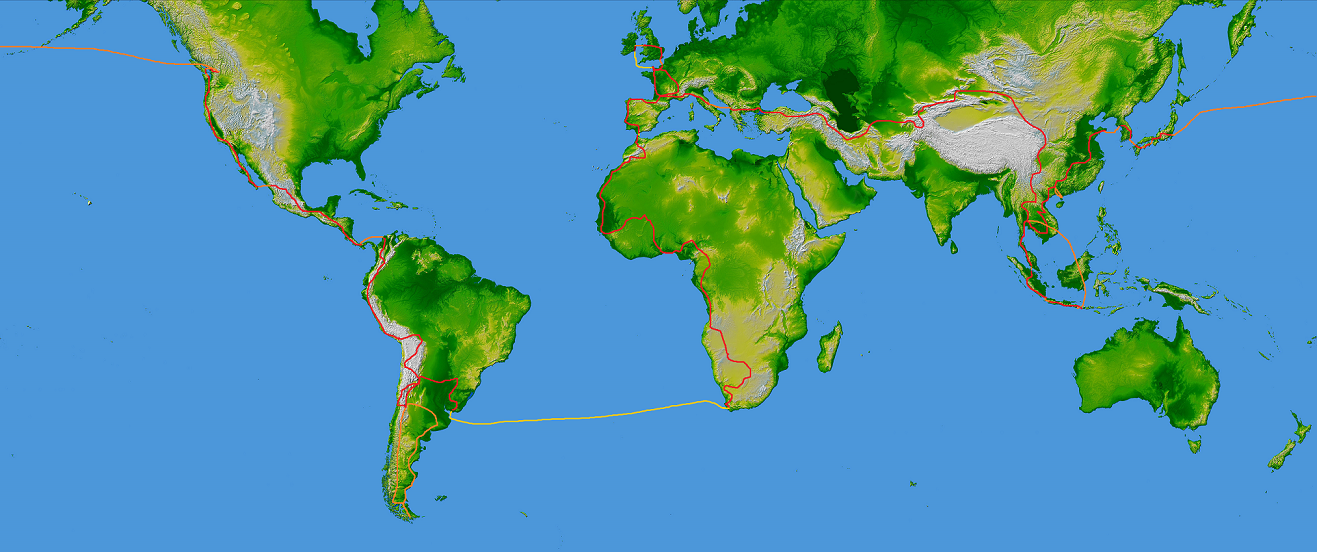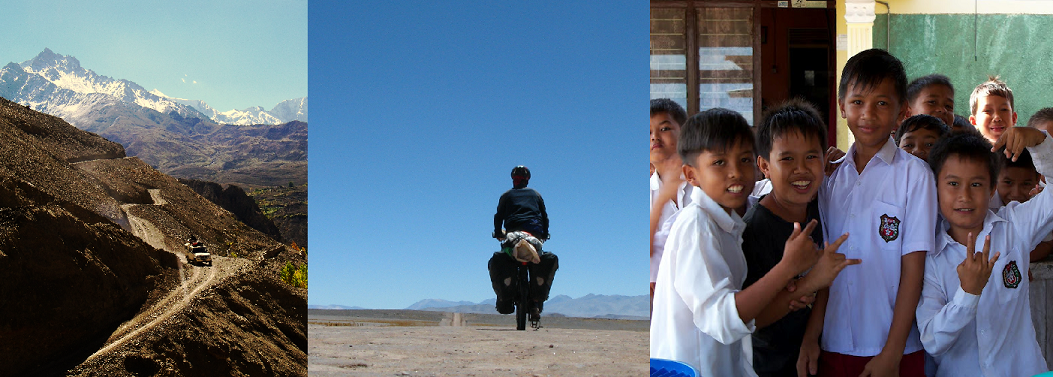Since the last entry in Agdz I rode across to Tata, via Foum Zguid, an exquisite journey through a stark and desolate landscape. In the 270 km between Agdz and Tata I can almost count on two hands the number of settlements that I passed. Since I have yet to erect my tent in Morocco and have become accustomed to staying in affordable hotels, I tend to try and make a town each evening and find a place to sleep there. So after a long day down to Foum Zguid I ended up in Hotel Bani. The lobby of the hotel appeared to double as a motorcycle repair shop and after checking on a couple of the rooms I settled on one just off the repair shop floor, where I could wheel my bike into without unloading it. After throwing the remnants of a now petrified loaf of bread into a bin in the repair shop I dusted down the rickety metal table and plastic chair. A closer inspection of the bedcovers led me to suspect that it was not common practice to change the covers between the departure and arrival of occupants so I decided it would be prudent to camp on the bare concrete floor with my new and untried air mattress that I had bought in Spain. After a hearty dinner of yet another tagine and yet more bread in a nearby cafe, I retired to my concrete floor, tired from the day's exertions and eager to get an early start on the road to Tata the following morning. I had a restless night on the floor, however, and despite the comfort of my mattress, I found myself waking up in pools of sweat and wringing my new travel pillow dry.
I had been having some kind of pleasurable dream when I came to in the darkness of the cell. I checked my recently purchased, made-very-definitely-in-China alarm clock and saw that it was just after 5am. I wasn't sure why I'd woken up, and then it started again. A loudspeaker on a pole outside my room was piping in the Koranic verses that were being chanted by a sombre sounding gentleman in the nearby mosque. I pulled up the hood of my sleeping bag over my head and faded in and out of consciousness whilst the chanting continued for a further hour. Moments after the chanting stopped, the shrill alarm of my new clock told me that it was time to knock back more vanilla-flavoured yoghurts, and a loaf stuffed with banana and peanut butter and get back on the bike.
Early morning and late afternoon is my favourite time for being on the bike. Not only is the temperature generally more agreeable, but the long shadows cast by the light give the landscape more depth and contrast than the blinding light of the midday hours. Riding east towards Tata, there was a pleasant chill in the air and an even more welcome tailwind that carried me along the first straight 40 km very enjoyably. Such was the tailwind that I had begun to plot the day ahead and review my estimated time of arrival in Tata. Then, mysteriously the road seemed to get stickier and the bike heavier and I realised that I had passed an invisible line and that I now had a stiff headwind to contend with for the remaining 100 km to Tata. In Tissint, I found the only cafe of the trip and ordered my mid-morning staple of an omlette, bread and a coke, instead of the regular mint tea. Deciding on food and drink is really just a question of deciding how you like your sugar.
The dust clouds blown up by gusts of wind forced me to take shelter inside the cafe and I sat content to be out of the sun whilst groups of school boys studiously examined every detail of my bicycle, the younger ones being particularly impressed with Tiger. After ordering the food the owner-chef-waiter of the cafe set about visiting the various stalls in the vicinity, gathering up supplies to put the meal together. After a long spell in the latrine he emerged and with a worringly short and soapless rinse of his hands under a tap in the corner of the room, he set about preparing the food. Having just recovered from a week's worth of olympic sprints to the nearest toilet, hole or bush, I was sensitive on this particular issue, but I enjoyed my omlette and wonderfully fresh, still warm bread and headed back into the white light. A jolly police officer waved me through the checkpoint in the middle of town.
The ride to Tata continued into ever strengthening headwind. Despite the road's orientation varying from southeast to northeast and back to east, the wind appeared to be a constant headwind. Gusts of fine sand easily passed my wraparound sunglasses and stripped another layer of skin off my lips. I deemed the occasion a suitable time for my recently acquired headscarf and I have found the long strip of blue cloth to work admirably well at keeping me cool and covered up from the elements. In addition, and this idea is still in experimentation phase, but I believe wee terrorists are less inclined to pester me when I have my head covered. The combination of cycling gear and head-dress also provides endless delight and photo opportunities for the now dwindling number of tourists passing by.
With 20 km to go to Tata I had to stop by the roadside and dig into the remaining reserves of chocolate, water, and bread to stave off the shaky leg syndrome that I could feel coming on. Moments later, out of the apparent uninhabited wilderness, a fellow and his five donkeys were making a beeline for me. "Unbloody believeable", I groaned outloud. Expecting a demand of some sort I braced myself for the encounter. Rashid introduced himself, however, with a shake of my hand followed by the typical touch of your heart and outlined the journey he was making on foot from Rich to Assa. If you plot this on a map of Morocco this is approximately 1000 km of foot plodding. An incredible journey, which despite my non-existent Arabic and his virtually non-existent French, I determined would take him approximately five to six weeks at the pace he was currently traveling at. I handed him a half litre of water and the remaining half loaf of bread, which he ate hungrily, before thanking me and heading on his way. I headed on towards Tata, with renewed enthusiasm at the prospect of a shower, another tagine, and thankful that I had Rocinante rather than five donkeys to travel with.
According to wikipedia, Tata has a population of 40,000 people. I would have thought more like 400, but regardless of the population, Tata is proving to be a pleasant break from the road. I have found peanut butter that is sold in 2 litre paint tins, very useful for the weight-conscious cyclist. I've been invited to a splendid collective meal of camel tagine, which I had initially taken for mutton, accompanied with fresh, creamy goats milk, and I've drunk mint tea by the pint, whilst watching the world go by. There is even reasonably priced beer available, but the bar isn't all that inspiring, and like the couple of others I've poked my head into in Morocco, feels to me like a dirty, little secret, hidden as always behind covered windows and occupied by those whose main intent appears unfortunately to be reaching the bottom of the next bottle.
Anyhow, having settled into the joys of cycling through Morocco, life, and camel steak, tastes good.
Tata, Morocco
Trip distance: 5790 km




